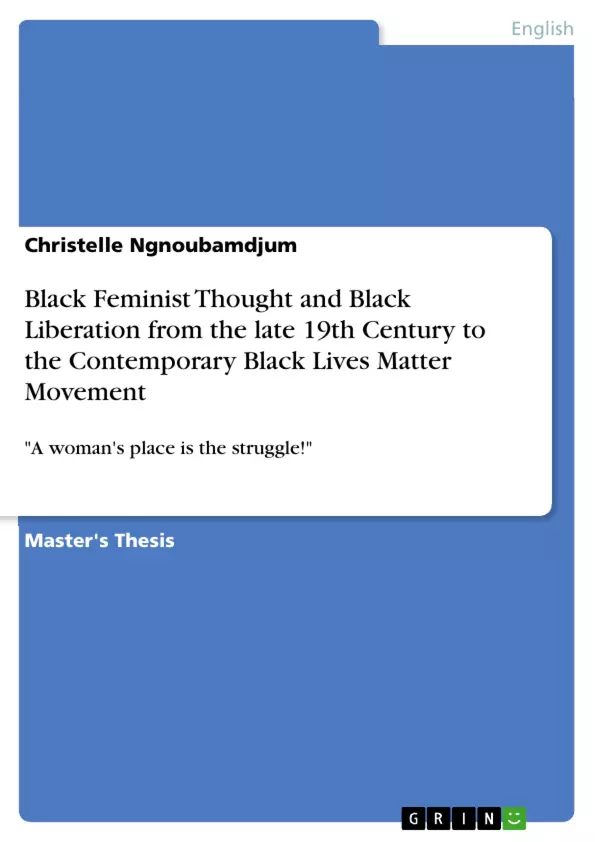This thesis wants to fill the gap and give an insight into the development, the continuity and hence the importance of Black feminist thought within the early and ongoing Black freedom struggle. Due to the complexity and indefinite spectrum of knowledge already produced, this paper aims at outlining a perspective that bridges the late 19th/ early 20th century thoughts and efforts of Black feminists with those of the 20th/21st century.
"There is no such thing as a single-issue struggle because we do not live single-issue lives."
Black women in the US have always played a crucial role in the struggle for freedom and recognition of human rights for the African-American population. Against all odds, they have always been the ones who looked out for and took care of the community. Be it in their own family, in the churches or while organizing resistance attempts against a consistent racism and sexism within US-society.
The opening quote by Audre Lorde, a self-described “black, lesbian, mother, warrior, poet”, focuses on the fact that human beings do not have one singular feature which defines and impacts their way of life, interactions with or struggles against others. Heterogeneity is the keyword. Black women recognized and understood early on the importance of dealing with the intertwining of various aspects, which all define their lives. Just to name a few of those aspects: being Black and female and poor and of little standard education and - maybe - queer - Many factors define one single person’s life, and therefore it is of no avail to put the focus on one single issue, when fighting for social justice.
Inhaltsverzeichnis (Table of Contents)
- INTRODUCTION
- THE EMERGENCE OF BLACK FEMINIST THOUGHT IN THE U.S.A.
- AIN'T IA WOMAN?
- BLACK FEMALE INTELLECTUALS
- Anna Julia Cooper
- Mary McLeod Bethune Liberation through Education
- Black Women's Club Movement
- TOWARDS #BLACKLIVESMATTER AND BLACK FEMINIST THOUGHT
- SOCIO-HISTORICAL CONTEXT
- THE SECOND WAVE OF BLACK FEMINIST THOUGHT IN ACTION
- Crossroads: Intersectionality – what does it mean?
- #BLACKLIVESMATTER
- Contextualizing the Hashtag #BlackLivesMatter
- Whose Black Lives Matter and Why?
- Intersectional Leadership Model
- Transnational Black Lives Matter
Zielsetzung und Themenschwerpunkte (Objectives and Key Themes)
This work aims to examine the development and evolution of Black feminist thought in the United States from the late 19th century to the contemporary Black Lives Matter movement. It explores how Black women have consistently played a vital role in the struggle for freedom and human rights for African Americans, navigating the intersection of racism and sexism within US society. The study highlights the key contributions of early Black feminist thinkers and activists, while also exploring the contemporary relevance and impact of Black feminist thought in the context of the Black Lives Matter movement.
- The historical and contemporary significance of Black feminist thought in the US
- The intersection of race, gender, and class in shaping the experiences of Black women
- The role of Black women in the broader Black liberation struggle
- The evolution and development of Black feminist theories and activism
- The relevance of Black feminist thought to contemporary social justice movements
Zusammenfassung der Kapitel (Chapter Summaries)
The first chapter, "Introduction," sets the stage for the analysis by highlighting the interconnectedness of struggles against racism and sexism. It introduces Audre Lorde's concept of “single-issue struggles” and emphasizes the multifaceted nature of Black women’s experiences.
Chapter 2, "The Emergence of Black Feminist Thought in the U.S.A.", delves into the origins and development of Black feminist thought. It explores the influential works of early Black female intellectuals, such as Anna Julia Cooper, Mary McLeod Bethune, and Sojourner Truth, and analyzes their contributions to shaping Black feminist consciousness. The chapter also examines the Black Women's Club Movement as a significant platform for Black women's activism and social change.
Chapter 3, "Towards #BlackLivesMatter and Black Feminist Thought," moves into the contemporary context. This chapter analyzes the socio-historical context that led to the emergence of the Black Lives Matter movement and examines the role of second-wave Black feminist thought in shaping the movement's trajectory. It specifically explores the concept of intersectionality and its significance in understanding the experiences of Black women within the movement. The chapter also examines the contextualization of the #BlackLivesMatter hashtag and its intersectional leadership model.
Schlüsselwörter (Keywords)
This work focuses on key concepts such as Black feminist thought, intersectionality, Black liberation struggle, racism, sexism, Black women's activism, social justice, and the Black Lives Matter movement. The study investigates the historical and contemporary significance of Black feminist thought within the broader context of the Black liberation struggle in the US.
Frequently Asked Questions
What is the core concept of "Intersectionality"?
Intersectionality describes how various social identities, such as race, gender, class, and sexual orientation, intertwine to create unique modes of discrimination and privilege.
Who were the key early figures in Black Feminist thought?
Early intellectuals include Anna Julia Cooper, Mary McLeod Bethune, and Sojourner Truth, who famously asked "Ain't I a Woman?".
How does Black Feminist thought relate to the Black Lives Matter movement?
The movement utilizes an intersectional leadership model, ensuring that the struggles of Black women and queer individuals are central to the fight for social justice.
What was the significance of the Black Women's Club Movement?
It served as a vital platform for activism, community care, and social change during the late 19th and early 20th centuries.
Why did Audre Lorde say there is no such thing as a "single-issue struggle"?
Because people do not live single-issue lives; their experiences are shaped by multiple overlapping factors that cannot be separated in the struggle for freedom.
- Arbeit zitieren
- Christelle Ngnoubamdjum (Autor:in), 2017, Black Feminist Thought and Black Liberation from the late 19th Century to the Contemporary Black Lives Matter Movement, München, GRIN Verlag, https://www.grin.com/document/471190



